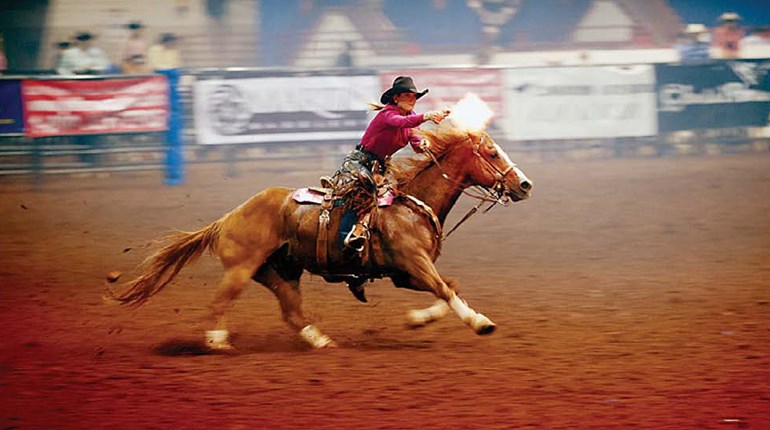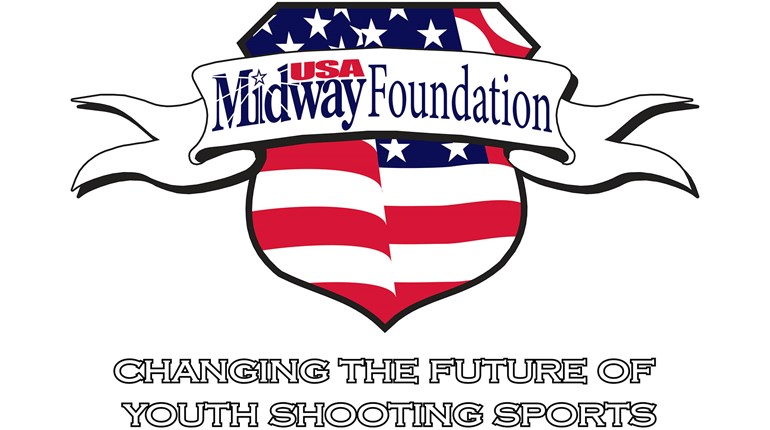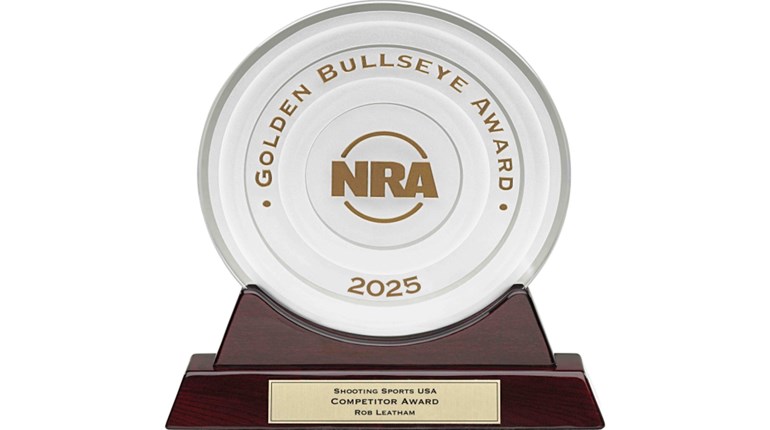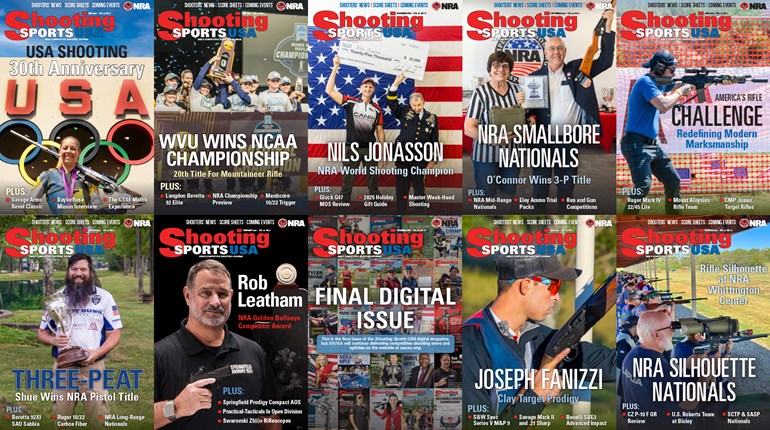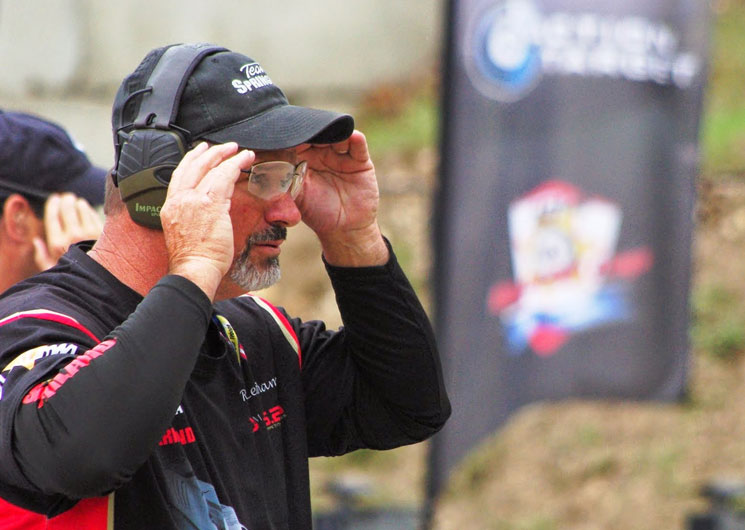
SSUSA: So, why is it that all the best shooters end up in Arizona?
ROB: It’s because when all of you guys are looking at snow, we’re still shooting.
SSUSA: Of course (laughs)! Also, congratulations on your 2014 Bianchi win! Have you had to build an extension onto your home for the 25 years or so of pistol trophies?
ROB: Thank you! The first Bianchi cup I shot in, believe it or not, was before it was the Bianchi Cup. I can’t remember the year the NRA took over [Editor’s note—NRA took over the Bianchi Cup in 1984], but the first year I shot the match was in 1982.
SSUSA: Is there something that you do to get mentally "tuned up" in the 20 minutes leading up to an event, right before you’re ready to go up to the line? Or are your nerves and excitement level taking over?
ROB: Actually that’s when my excitement level is the highest. I’ve always had a strong motivation to do well over the years, so when I get to an event I become excited from all that motivation. Also, what I found interesting is that this many years later, with all my experience, I still get nervous every single time I walk up to the line. You would think at some point the excitement and the nervousness would be gone, but I still anticipate the event and, the most frustrating part, I’m making the same mistakes I made back in 1982. I start jerking and inching, and I’m impatient. But, the exciting part is that, 30 years later, I still get the same thrill of walking to the line and competing, and not just Bianchi Cup but with every event. The frequency of the mistakes, and maybe the severity of the mistakes, is much less than what it was when I first started competing, but the courage and the excitement are nearly the same. When I walk up to the plate event and I shoot a good score, on any one of the four events, it’s hard to explain the feeling I get. It’s not so much a “Woo hoo, I won the lottery!” kind of a feeling, it’s more of a release that I was able to execute and preform the way I wanted.
As competitors walk off the line, very few of them are happy. The happy competitor is the one that actually walks away from the event, either a stage or a position of the stage, and thinks “Well I shot as well as I thought I could,” and that satisfaction, right there, of knowing I executed my shooting skills to meet my expectations, pleases me. Again, it’s not a “Woo hoo, I won the lottery,” but it’s a release. It’s not so much a high point, but avoiding the low point. When a competitor walks away from a stage and they shot poorly, they think to themselves, “Man, I have to wait a whole year for a chance at retribution”. The frustration level from that train of thought, is what keeps me coming back to competitions. I have never shot at any match, in all my years, and not wished I had done something better. I have a drive to do my best, which is the reason I have kept doing it for all these years. I think to myself, “hit one more plate,” “just try and clean it,” or “still try to clean the plates.” It’s a motivation for me that’s hard to explain; I guess it’s my white whale.

I suppose winning should be the ultimate goal, yet during my long competition career, I have found that if I focus on my performances, the wins come as a result of better execution.
SSUSA: Do you think there are factors beyond the shooter’s control that could affect their performance?
ROB: I do. For example, other shooters are probably better than I am at dealing with nerves, that’s something I can’t control. Yet, I learned a long time ago, that I wasn’t going to let being nervous set my limitations. Some competitors fight their nerves or give into them, and they’ll use being nervous as a reason for a poor performance. I see it quite differently. I have never walked up to a stage and not been nervous. So for me it’s a given, I’m going to be nervous and there is nothing I can do about that. You will always have competitors come off the line and say, “If I could only control my nerves I would do better.” Well I have news for them … they can’t. The nervous element is there because you, as the shooter, care about the results. I know that the next time I walk to the line, I will be nervous, so I have taught myself how to perform considerably well in that state. Honestly, I’m more worried about the day when I walk out to compete and I’m not nervous at all.
SSUSA: Do you have a go-to place for when you’re nervous, or a go-to place in general before competing? For example in Bullseye Pistol, one of the shooters said, “I think about sight picture and I try to relax. If that doesn’t work, I look at a picture of my family, and then I’ll go back and envision my sight picture.” Do you have any kind of a ritual or a mind game you play during competitions or events?
ROB: Well it depends on the event. For speed events I don’t need a ritual because I like the nervous energy, it helps my performance. For accuracy events, like Bianchi, I try to … drum roll please … hold the gun steady. I make those sights stop moving. Also, if I have time, I try to be consciously aware of feeling the trigger. For example, I don’t physically pull the trigger—I don’t pull a little bit and pull a little bit. Instead, I try to have enough conscious focus to be mentally aware of the trigger pull, so when I am ready I can pull the trigger extremely well.
SSUSA: That’s interesting—to be consciously aware of the trigger, rather than let the fight-orflight instinct pull it for you.
ROB: Right, because my normal mode is to put the sights on the target and pull the trigger as fast as I can, which is what is causing the problem when put into the context of accuracy. I take the same approach for accuracy that I do for speed shooting—which of course requires accuracy. However, the difference is that I need to be a lot more exact during accuracy events. So I try to make the sights stop moving, and contemplate pulling the trigger. I physically and mentally focus on those two elements simultaneously. As for easing my nerves, I don’t have any tricks. Although I do, occasionally, have to stop and tell myself, “As important as you’re making this event, the result of this performance will not change your life at this point.” I think that would be my go-to place, reminding myself that the competition is important, but not damaging to my life. Sometimes I’ll take competitions so seriously that I lose perspective; over the years, I have put more emphasis on shooting a pistol than it deserves in life.
If you look at a professional baseball player, when he is in the minor leagues, he lives and dies on his performances. He cares about nothing but the game. Players live like that before they break into the big leagues, if they even do. Then when they’ve entered the big leagues, which must mean they are really good, their lives change. They develop more external pressure, and at that point they either fold like a cheap deck of cards or they realize they have made it. I think I t into this category. I’m very confident in my ability, yet I recognize that my life doesn’t change from my performance. Major league baseball pitchers can’t go out to pitch and think, “If I don’t get this out, then tomorrow my life is ruined.” There is a possibility that their life could be shattered, but they can’t go into the game thinking that way. It is the same for a beginning shooter as it is for somebody at my level; you point the gun at the target and pull the trigger. And for me, win or lose, my life doesn’t get any better or worse because of it. On the other hand, you still need to place some kind of value in what you’re doing so you don’t set yourself up for failure—there is a balance there that needs to be found.
SSUSA: Right, you won’t have the drive to practice enough if you don’t cherish what you’re doing.
ROB: Exactly. I know a lot of good shooters that aren’t going to be great because they are missing that one little bit. They always step back and say, “Well wait a minute, I might want to do something else.” They de-emphasize the elements that allow them to perform well, and one of those elements is to have a high value for what they are doing. When all the top shooters walk to the line, the performance they are about to execute is the single most important event at that very moment. They are 100 percent focused right then and there. As those top shooters step up to the line, for those next 10 minutes while they are shooting—well, it wouldn’t matter if a world war started or a horde of zombies ran across the range—they wouldn’t let anything tear them away from their focus. That is the kind of attention you need to have to perform at your highest level.
SSUSA: It’s not just practice and appreciation for the sport that helps you win again and again. Some competitors can shoot great practice scores, but choke when all eyes are on them. How important do you think it is to be comfortable in front of a crowd while at a competition?
ROB: There are different atmospheres at different matches, so it depends. At an IPSC match, there might be a bay full of people at the back watching you shoot. But, there are 10–15 shooters in a squad and one person shoots at a time. So ultimately, the people watching you shoot are the range staff and the other competitors you’re battling against, not the people in the bay.
SSUSA: You mean other professionals?
ROB: Correct, other professionals just like you. They understand the game and they understand what you’re going through. You’re not trying to impress them, you’re trying to beat them. However, it’s a different atmosphere at Bianchi. You’re ready to make a performance for people because there are larger crowds and camera crews. When a pro walks to the firing line and everyone is watching, he has made it into what we call the procession. We have camera crews working around us and every shot. In some instances you’ll just see the cameras, in others you have to wait for the crews to get out of the way. Now, those cameras may bring about performance anxiety, so it’s important to be comfortable. But this drives me, and for two reasons. One, I don’t want to look like a fool in front of these people. Two, I want to entertain. And this is all based off of my confidence going into the event. If it’s something I’m strong and confident in, I go into performer mode, and I want to perform well. In the end, the camera crews help my performance.
SSUSA: It’s like telling yourself “I don’t mind the rain … boy, I hope it rains today”. Telling yourself "don’t mind the camera crews" can be a benefit to you in the competition.
ROB: That’s right, and actually I do mind the rain (laughs)! In motorcycle racing, which I did at the amateur level, racing in the rain is a large factor in performance. If there was a rain race, I was a guaranteed loss because I wasn’t going to ride, I wasn’t good enough to compete in the rain. It hardly rains in Arizona so I never got enough practice. The superb riders loved it when it rained because it separated the skilled from the unskilled. Veteran racers with unyielding bike control would beat me by 20–30 seconds in a dry race, but in the rain they would beat me by several laps. Competitive shooting is exactly the same. You’ll see people on the practice ranges shoot amazing scores and you’ll think, “Wow this guy might beat me in the match! He’s shooting the same scores, or better, than I am.” Yet, at the match, that shooter’s performance, wasn’t that good. The spectators and camera crews raised his anxiety level, which worsened his confidence and performance.
SSUSA: We spoke to Rob Vadasz last year, and he ended up squadded on the plates by himself. Would you say that if you have your mind game together, and you’re comfortable enough, then your performance will not falter whether you’re shooting by yourself or with a hundred others?
ROB: Well, having other shooters up there helps to spread out the attention, but in the long run, it doesn’t really matter. Competitive shooting is a very personal and individual sport. Even in Bullseye when you have a hundred other shooters on the line, it still doesn’t change that you believe the whole world is watching you, it’s just innate. But the reality is that you don’t care what the other people are doing, and they don’t care what you’re doing.
Truthfully, the other guys that have shot, are not really paying attention to you. For those waiting to shoot, they’re looking at you because they’re using that build-up as a part of their performance, but it’s almost like they’re watching through a haze. They’re not as interested in your performance as you might think they are. If you were to ask other shooters, “What did I shoot in that last event,” the chances of them knowing are slim.
SSUSA: In 2014 during the Bianchi training day, you said something I had not heard before. You asked students, “What was the last thing you saw?” You wanted them to recognize the “front sight lifting”. Could you elaborate on that? Is this a problem that happens with new shooters?
ROB: Yes. They focus on the shot right up until they decide to shoot, then the instant they decide to shoot, all focus has shifted to their next task. So then, the problem isn’t that the mistake occurs, it’s that they are unaware of what the mistake was. The gun will always show you what is happening, if you’re paying attention. You’ll always see the gun move in the direction of the shot. You shouldn’t walk away and be shocked about your results, for the gun will show your mistakes. For instance, I missed two points last year and I saw the mistakes for both as soon as they happened. It was my inability to aim the gun as well as I wanted to. The first shot I missed was at 25 yards, and the sights moved to the lower left of the target. I was in the process of pulling the trigger while the gun was still pointed down to the lower left, and it was a miss. Also, that shot probably had a little jerk on it. For the next miss (my gun shoots two inches high at 25 yards), my sights were within an inch of the top of the target when my gun went off. In no way was I shocked at either of those results.

As for my good shots, I don’t remember them. When everything goes right and the target falls down, that means you did what you planned on doing. I really don’t come away with much, as far as a memory. It’s when I fail that I want to remember what I did. I don’t want to come off the line and think, “I have no idea how I missed that. Everything looked perfect.” Most shooters that I have coached gear up to the shot and then as the decision to re the shot is made, or once the gun starts ring, they’re focused on something else. The first thing competitors need to learn is to look where and why they are shooting, and then note the exact destination of their bullet. This isn’t something new, it’s actually an old term known as “calling your shots”.
In multiple target events, when shooters have decided to re a shot, most likely they have made a mistake. Their focus has already passed on to the next target. So, all shooters need to keep the front sight picture as their primary focus until the current target has been hit and to remember, but not dwell, on their mistakes.
For an accuracy driven match, like Bianchi, long term memory is not as important as short term memory. If you are at the level of competition where you are hitting 99 percent of the shots you re, you only need to remember the last three seconds of each shot to learn from your mistakes. The remaining one percent of shots missed are the most important to remember. You just don’t learn much from the targets you hit, but I try to recall my mistakes from the shots I missed every time at the line, so I don’t make them again. For example, I'll remember that at 25 yards I was not holding my gun very well, so the next time I practice I will use that information for my development, and improve those problem areas.













